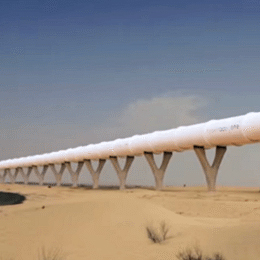Dubai Hyperloop : A quantum leap to the future
ABU DHABI: The world’s first high-speed train that could bend distance and time using new magnetic technology in transporting people and cargo had successfully passed the first full scale real-world test run.
The UAE government tapped the US-based start-up company Hyperloop One to build the project also known as Hyperloop One. Described as a cross between a train and a plane traveling at 375 KPH, it would cut to just 12 minutes the 2 hours current travel time between Abu Dhabi and Dubai when completed in 2020.
This new mode of transport would carry passengers via pods or capsules passing through tubes elevated magnetically. The first commercial operation is projected to happen on or before Expo 2020 which Dubai is hosting.
About 4,000 vehicles travel daily between the two emirates causing huge traffic congestion which translates to about $800 million in lost working hours, experts said.
Dubai’s Road and Transport Authority (RTA) signed an agreement with Hyperloop One to build this new form of transport between Dubai and Abu Dhabi in line with the vision of H.H. Sheikh Mohammed Bin Rashid Al Maktoum –Vice President and Prime Minister of the UAE and Ruler of Dubai in collaboration with the Dubai Future Accelerators.
Hyperloop One separately signed with DP World an agreement “to pursue a cargo-based Hyperloop One system at Jebel Ali port.” The idea is to expand the technology to cover transporting cargo within GCC.
By eliminating distance and time, Hyperloop can travel at speeds of 1080 kmh within cities in the region, thereby, creating new opportunities in manufacturing, warehousing and supply chain distribution.
In the wider GCC, the cargo transportation market was worth about US$35 billion in 2016, according to McKinsey & Co. Of this, Hyperloop One has an addressable share of around US$12 billion, excluding short-haul, intra-city shipping and low-value commodity freight such as oil and chemicals, metals and minerals and agriculture and food products, the UAE government said.
Hyperloop One would compete for 100 percent of air freight in the GCC, a US$7 billion market, 22 percent of the surface freight, which is about US$3 billion in road and rail freight and 13 percent of the maritime freight, equating to roughly US$2 billion.


